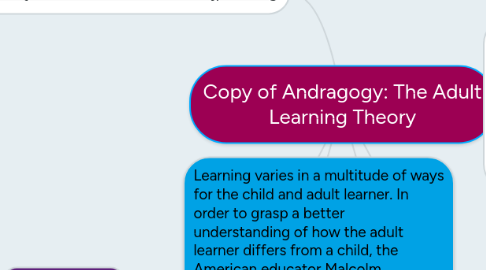
1. Learning varies in a multitude of ways for the child and adult learner. In order to grasp a better understanding of how the adult learner differs from a child, the American educator Malcolm Shepherd Knowles created 'Knowles Five Assumptions of Adult Learning'. These assumptions of adult learners can be applied to the online education setting for adults in three specific ways: Self-Concept, Motivation to Learn, and an Orientation to Learning.
2. Orientation to Learning
2.1. People mature to form time perspectives that change from procrastination and delayed application of intelligence to an immediate application of knowledge to ones individual immediate tasks. One's orientation of learning grows to problem-centered rather than as a child revolving around subject-centered orientation to learning.
2.1.1. Find and understand new meanings to concepts and information previously learned.
2.1.2. Relevant knowledge improves learning for adults when it corollaries to reaching personal goals.
2.1.3. Adults bring real-life experience to learning, as well as look for knowledge to be used in real life to further their careers and future goals.
2.1.4. Younger learners tend to accept the fact what they are learning may not be used later one.madults require the ability to apply knowledge learned to life .
3. Self-Concept
3.1. As people mature their self-concept which previously was a dependent individual grows into a self-directed individual.
3.1.1. Adults resist knowledge or actions forced unto them.
3.1.2. Personal goals.
3.1.3. Availability of resources for self-directed research.
3.1.4. Option of forums/support groups to ask questions.
4. https://m.youtube.com/watch?v=RvAjpSv3CPg
5. The term 'Andragogy' was used in association with adult education by Malcolm Shepherd Knowles, an American educator who theorized adult education. The first known use of the term was in 1833 by Alexander Kapp, who used it to explain Plato's elements of education.
6. Motivation to Learn
6.1. Motivations to grow in an educational setting matures to revolve around internal motivation rather than outside influence and pressure.
6.1.1. Projects and tests can be used to improve student motivation to actively see progress in educational goals. This concept is a large part of online learning for adults, the entire course is dependent on the students motivation for learning.
6.1.2. The ability to ask questions and understand how the knowledge will be useful in real life relates to the motivation for learning in adult learners.
6.1.3. Learning for adults is either or both utilitarian or goal-oriented.
6.1.4. They are motivated in instances where knowledge will be beneficial and is needed.
6.1.5. Adult learners need to be able to be active in their instruction and evaluation, especially in an online setting.
